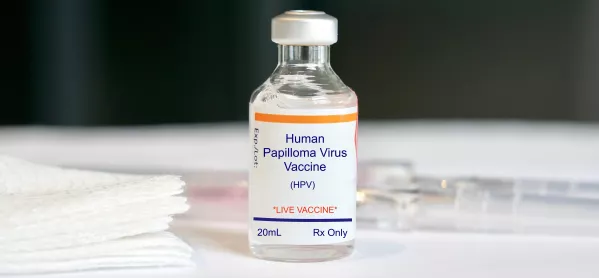The imminent rollout of the HPV vaccine to boys in schools could help to prevent more than 100,000 cancers, according to new research.
The human papillomavirus (HPV) group of viruses are linked to about 5 per cent of cancers, including cervical, penile, anal and genital cancers and some cancers of the head and neck.
The vaccine has been available for girls since 2008, with rates of the cancer-causing strains of the virus falling by 86 per cent among young women aged 15 to 19.
HPV: School vaccinations linked to ‘dramatic’ fall in cervical disease
Teacher health: We need to make time for smear tests
Want to know more? Why the body is as vital as the brain when it comes to learning
From September this year, both boys and girls aged 12-13 will be offered the vaccine through school for free from the NHS, and will remain eligible for this until their 25th birthday.
According to new estimates from the University of Warwick, the HPV vaccine programme will lead to the prevention of more than 64,000 cervical cancers and nearly 50,000 non-cervical cancers by 2058.
This would be 50 years after the introduction of the vaccination programme, when those who were vaccinated as teenagers have reached the age groups typically affected by HPV-related cancers.
Dr Mary Ramsay, head of immunisation at Public Health England, which is leading the rollout, said: “Offering the vaccine to boys will not only protect them but will also prevent more cases of HPV-related cancers in girls and reduce the overall burden of these cancers in both men and women in the future.
“I encourage all parents of eligible boys and girls to make sure they take up the offer for this potentially life-saving vaccine.
“It’s important not to delay vaccination, as the vaccine may be less effective as adolescents get older.”
Jonathan Baggaley, chief executive of the PSHE Association, said that teachers would have a vital role to play in the extension of the programme.
“Health Education will be a compulsory aspect of the PSHE education curriculum from 2020, and vaccination is included as a topic in the new statutory guidance,” he said.
“This provides a great opportunity to educate all girls and boys on the benefits of the HPV vaccine, and the purpose of vaccination and immunisation more broadly.
“Schools don’t need to wait until 2020, however - many already have high-quality PSHE in place and should be encouraged to teach about vaccination as part of their current programmes.”




